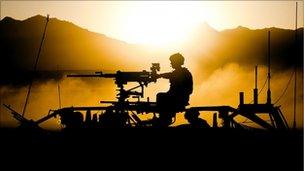'I had a nervous breakdown. I just couldn't cope'
- Published

The charity Combat Stress helps thousands of former service personnel
Hugh Forsyth spent 11 years in the Army in the Royal Engineers, with an ordnance disposal regiment, serving in Northern Ireland and Bosnia.
This is his account of how he coped with the transition to civilian life and how he put his life back together with the help of charity Combat Stress - which has just launched a stress helpline for troops.
"I joined the Army at 16. Eleven years later, at the age of 27, I was classed as an old man in army terms.
When I left the forces it was like starting again. I didn't know what to wear when I got up in the morning and I didn't know how to pay the bills or cope with the simplest of things.
I didn't have a job initially, my wife was pregnant and so the pressure was on.
I realised that during my 11 years in the Army I had just been treading water.
When I did get a job in fibreoptics, I worked very long hours. I didn't feel I was worthy of the pay unless I worked harder and longer hours than anyone else.
I was constantly frustrated with the people I worked with, other civilians.
I just went back into corporal mode, I forgot where I was and I ended up ranting at people all the time.
All I had known for 11 years was hard work, hard graft - in fear most of the time. My adrenalin was up for that whole period.
So afterwards I was a mess. I came home and drank a lot, I was arguing and shouting at my wife and kids. Life was grim.
'Health and safety'
Then my marriage broke up.
I was on my own, not connecting with anyone because I felt no one understood me or what I had been through.
Since I'd left, I had been re-running everything I did during my time in the Army. I had flashbacks every day and that just continued.
Eventually I had a nervous breakdown. I just couldn't cope. Then I ended up in hospital after overdosing on pain medication over four days. They diagnosed me with a minor adjustment disorder and sent me home.
I was lucky to get through that.
Somehow I got myself together and did a nine-month course which allowed me to retrain as a systems analyst. I came top of the course, did really well and got a job with a council paying a good salary.
But then they asked me to have a medical, as a formality before starting the job, and because of my bad back - which I take constant medication for - they said I couldn't do the job, for health and safety reasons.
I couldn't believe it. I thought it was a joke. I blew up at them, asking them if they realised what I had been through. Did they understand what health and safety really meant?
'I've learned how my brain works'
It was a war pensions officer I went to see soon afterwards who first mentioned post traumatic stress disorder, PTSD. I laughed off the idea.
But she told me 'you are not just depressed, there is something else going on here'. So she sent my details to Combat Stress.
When I went to see them I didn't know what to expect. But the minute I arrived I was told 'there are no heroes here, you can come in here and cry your eyes out'.
Being told that made me a bit nervous. When you are in the Army, you don't cry.
They diagnosed me with PTSD. I spent two weeks at a time, three times a year staying with other veterans at a specialist centre run by Combat Stress.
There was lots of sitting in groups with ex-service people, talking to them and bouncing ideas off them. I got behavioural therapy too.
After six years of being helped by the charity I have learned how my brain works, learned stuff about my body I didn't know and, most importantly, I've made friends, good friends.
The people I met through Combat Stress are better friends than the ones I made in the Army. They know me well and I can have a laugh with them.
The great thing about the charity is that there's always someone to talk to - even if it's just a trivial thing that's bothering me, and there is also support for wives and partners too.
My wife - I have remarried - knows now that I am not just someone who kicks off all the time. She understands why I get stroppy, she knows the signs.
When I first came to Combat Stress I couldn't even say the words 'bomb' or 'contact'. They helped me put my memories in perspective."
- Published11 March 2011
- Published6 October 2010